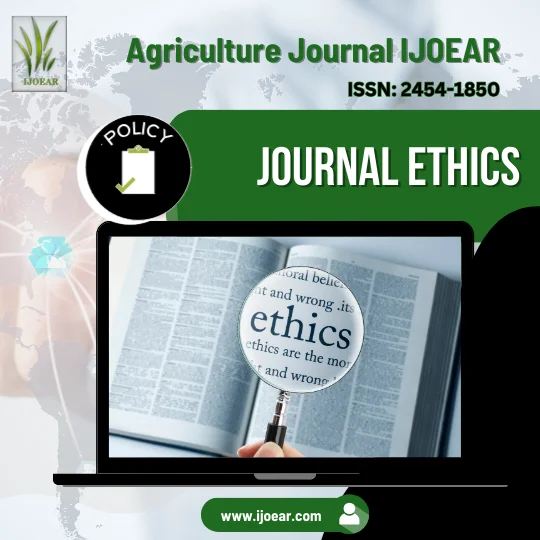 November 2025 Articles
November 2025 Articles Impact Factor: 6.69
Impact Factor: 6.69  Submit Article
Submit Article 
|
Citation Indices
|
All
|
Since 2020
|
|
Citation
|
6164
|
5117
|
|
h-index
|
31
|
29
|
|
i10-index
|
201
|
165
|
|
Acceptance Rate (By Year)
|
|
|
Year
|
Percentage
|
|
2024
|
11.09%
|
|
2023
|
15.23%
|
|
2022
|
12.81%
|
|
2021
|
10.45%
|
|
2020
|
9.6%
|
|
2019
|
14.3%
|
|
2018
|
17.65%
|
|
2017
|
16.9%
|
|
2016
|
22.9%
|
|
2015
|
26.1%
|

The International Journal of Environmental and Agriculture Research (IJOEAR) upholds the highest ethical standards in publishing to ensure the integrity and reliability of its contributions to the scientific community. By submitting a manuscript to IJOEAR, authors confirm their adherence to these ethical guidelines and commit to the principles outlined in this policy.
IJOEAR strictly follows globally recognized publication ethics and policies, including:
When publishing with IJOEAR, authors must adhere to the following ethical responsibilities:
Authorship should include only those who made substantial contributions to the research study's conception, design, execution, or interpretation.
Submissions must be entirely original. If other works are referenced, they must be appropriately cited or quoted.
Authors may be required to provide raw data for editorial review and ensure public access if necessary.
Manuscripts describing the same research should not be submitted to more than one journal simultaneously. Prior publications as abstracts, theses, or preprints must be disclosed.
Proper attribution to all references and contributors is mandatory.
Authors must disclose any financial or personal relationships that could influence the research or interpretation.
Authors must notify the editor promptly of significant errors or inaccuracies in their published work and cooperate in retracting or correcting the article.
Research findings must be presented accurately, with an objective discussion of their significance.
Research involving humans or animals must comply with ethical guidelines, with appropriate approvals documented in the manuscript.
Studies involving patient data or images require documented informed consent and ethics committee approval.
Ethical publishing ensures the credibility of research and supports the scientific method. Peer-reviewed articles are a cornerstone of knowledge sharing and reflect the quality of the authors’ work and their supporting institutions.
IJOEAR is committed to fostering a transparent and ethical research environment, holding its contributors to the highest standards of integrity.
For any queries or additional information, authors can contact the editorial team via email at info.ijoear@gmail.com or info @ijoear.com.com .